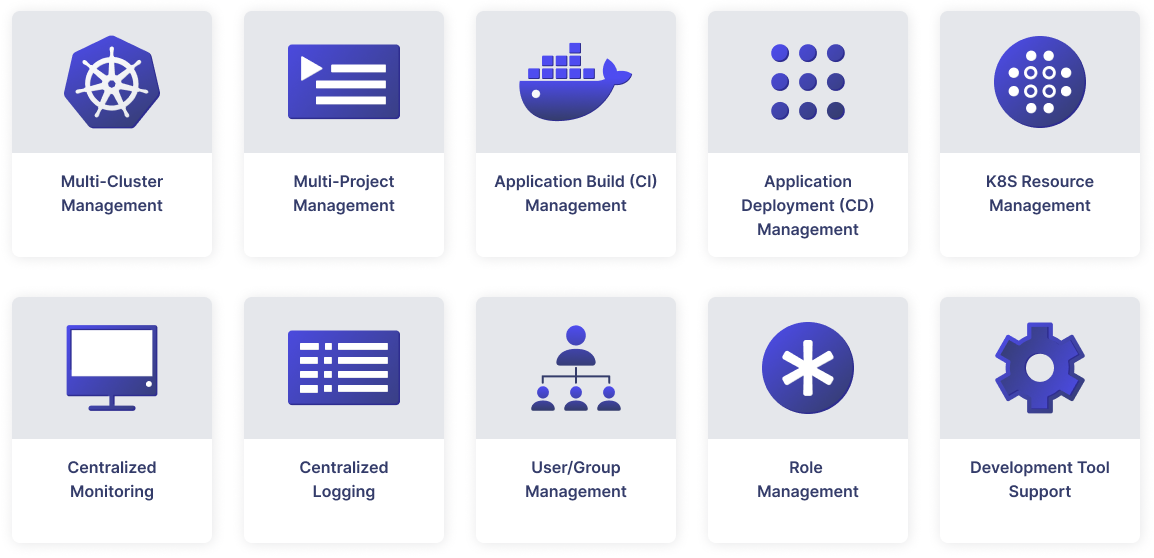Introduction
The Cloud ZCP is a module within the Cloud Z Modernization Platform 2.0 that offers a Container Management Service. This platform integrates essential technology elements to transform IT systems into a modernized, cloud-native architecture, simplifying and accelerating the modernization process for enterprises.
Key Features
ZCP console provides an administration portal for:
- Managing Kubernetes resources
- User and project management
- CI/CD pipelines for development environments
- Monitoring and logging for production environments
Container Management Service
Service Background
Enterprises often face complex business needs that cannot be met by a single platform or cloud. By combining the security of a private environment with the innovative services of multi-cloud, businesses can swiftly adapt to changing market demands.
This platform addresses four key enterprise needs:
- Enhanced Security: Protect organizational data and comply with legal and regulatory requirements.
- Enhanced Productivity & Predictability: Operate infrastructure with predictable performance and increase productivity with optimized systems.
- Cost Savings: Reduce costs through efficient resource utilization and rapid business expansion.
- Innovate Faster: Quickly deploy infrastructure and leverage new technologies for rapid development and validation.
Objectives and Applications
ZCP is designed to swiftly secure services in a multi-cloud environment using containers and Kubernetes. It provides essential elements for cloud-native application development in an integrated package, enabling rapid development and operation.
This platform ensures the portability of cloud infrastructure, mobility of services, completion of hybrid architecture, and scalability for cloud-native development.
Benefits
The Cloud ZCP console offers an integrated PaaS environment for developing and operating business applications using containers and Kubernetes in both public and private cloud settings. This reduces the time and cost for developers and operators by simplifying the adoption of the latest technologies.
By adopting container management services, customers can minimize the effort required to build a complex PaaS environment. This allows them to focus on business development, quickly deliver new services, and ensure a stable, scalable platform for service development and operation.
Prerequisites
To utilize the ZCP console, users need a basic understanding of containers and Kubernetes. Additionally, knowledge of pipeline configuration for building and deploying containerized applications, as well as monitoring and logging in a Container & Kubernetes environment, is required.
Service Coverage
The Cloud ZCP optimizes development and production environments for the Kubernetes platform, offering the following features for managing Kubernetes clusters and workloads:

- Multi-Cluster Management: Register Data Plane Clusters for business workloads, and install and manage monitoring agents.
- Multi-Project Management: Manage projects, build and deploy business applications, and manage members, groups, and permissions on registered Data Plane Clusters.
- Application Build (CI) Management: Use an intuitive UI/UX and pipeline to quickly build business applications into containers.
- Application Deployment (CD) Management: Use an intuitive UI/UX and pipeline to rapidly deploy containerized applications to Data Plane Clusters.
- K8s Resource Management: View and update Kubernetes resources (Deployment, Service, Pod, Ingress, etc.) across all Data Plane Clusters.
- Centralized Monitoring: Install monitoring agents on every Data Plane Cluster, store metrics in a metric repository on the Control Plane Cluster, and visualize via the ZCP and Grafana dashboards.
- Centralized Logging: Install an Agent for log collection of running containers on all Data Plane Clusters to store all logs in a log store on the Control Plane Cluster and support visualization through dashboards in Console and OpenSearch Dashboards.
- Centralized Logging: Install log collection agents on all Data Plane Clusters, store logs in a log store on the Control Plane Cluster, and visualize through the ZCP and OpenSearch dashboards.
- User/Group Management: Manage global users and groups, as well as per-project members and groups.
- Role Management: Supports the ability to manage permissions for three areas (Add-on Tool, Kubernetes Cluster, and Console) on a per-system user, per-project user, and per-group basis.
- Role Management: Manage permissions for Add-on tools, Kubernetes clusters, and the ZCP console on a per-system user, per-project user, and per-group basis.
- Development Tool Support: Support source geometry management (Gitea), library storage (Nexus), and image storage (Harbor) tools required for application development.
Constraints
Supported Browser
The console provided by the Cloud ZCP platform is optimized for the Chrome browser and may not work properly with other browser.
Supported Kubernetes Versions for Control Plane Cluster
| Kubernetes Version | AWS EKS | Azure AKS |
|---|---|---|
| 1.30 | O | O |
| 1.31 | O | O |
| 1.32 | O | O |
Supported Kubernetes Versions for Data Plane Cluster
| Kubernetes Version | AWS EKS | Azure AKS |
|---|---|---|
| 1.30 | O | O |
| 1.31 | O | O |
| 1.32 | O | O |